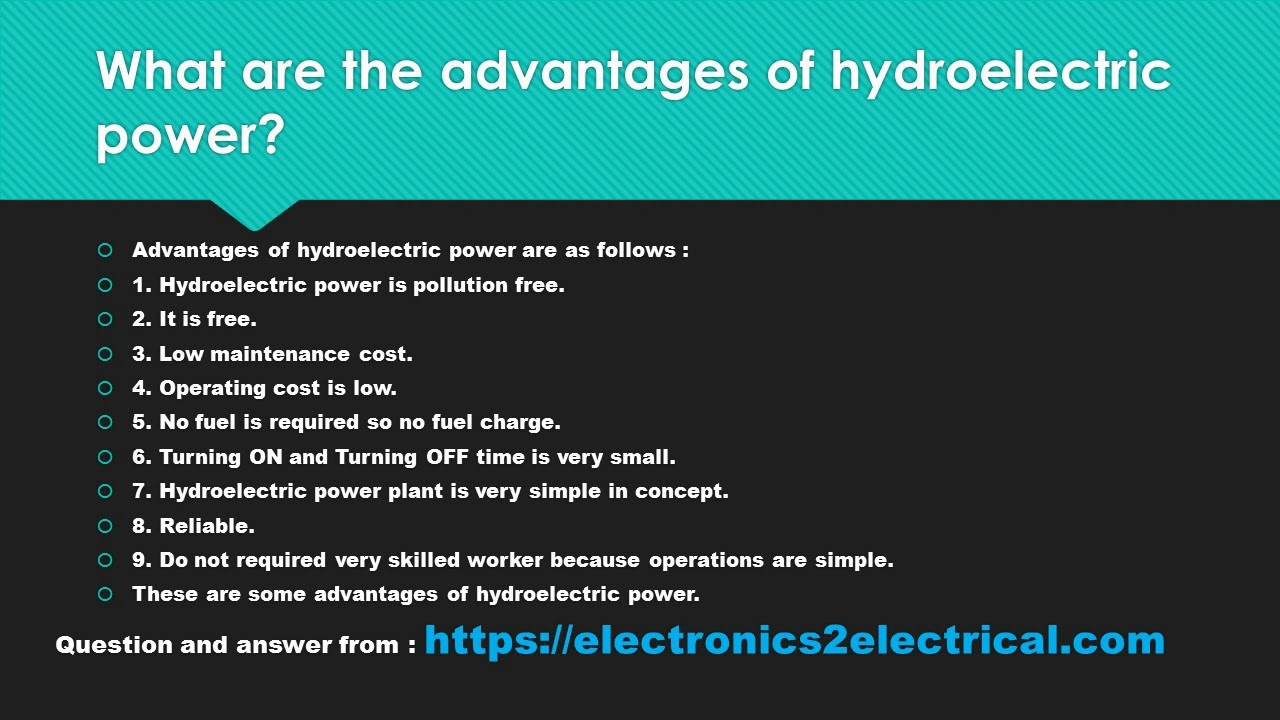Benefits of Hydroelectric Power
Hydroelectric power is a renewable source of energy that harnesses the power of flowing or falling water to generate electricity. It is a clean and sustainable form of energy that offers numerous benefits over conventional power sources. In this article, we will explore the many advantages of hydroelectric power and why it is considered an essential component of the global energy mix.
Reliable and Renewable
One of the primary benefits of hydroelectric power is its reliability. Unlike other renewable energy sources that rely on weather conditions, such as solar or wind power, hydroelectricity can be generated consistently, regardless of the time of day or season. As long as there is a constant supply of water, hydroelectric power plants can operate continuously, providing a stable and reliable source of electricity.
Environmental Friendliness
Hydroelectric power is known for its minimal environmental impact. Unlike fossil fuels, which release harmful greenhouse gases into the atmosphere, hydroelectric power plants produce virtually no air pollution. This makes it a clean and sustainable alternative to traditional energy sources.
Reduced Carbon Emissions
By utilizing hydroelectric power, we can significantly reduce carbon emissions. The generation of electricity from hydroelectric plants produces no direct emissions, making it a crucial contributor to global efforts to combat climate change. By transitioning from fossil fuel-based power generation to hydroelectric power, we can mitigate the harmful effects of greenhouse gas emissions and work towards a cleaner and greener future.
Cost-Effective
Hydroelectric power is also cost-effective in the long run. While the initial construction costs of hydroelectric power plants can be significant, the operational costs are relatively low. Once the infrastructure is in place, the ongoing expenses, such as maintenance and fuel, are minimal. This makes hydroelectric power an economically viable option, especially in areas with abundant water resources.
Job Creation and Economic Development
The development of hydroelectric power projects contributes to job creation and economic growth. The construction and operation of hydroelectric power plants require skilled labor, providing employment opportunities for local communities. Additionally, the revenue generated from hydroelectric power generation can be reinvested in other sectors, further stimulating economic development.
Flood Control and Water Management
Hydroelectric power plants often serve a dual purpose by providing flood control and water management capabilities. By regulating the flow of water, these plants can help prevent flooding during periods of heavy rainfall. They also support water supply management by ensuring a consistent water supply for irrigation, drinking water, and other essential needs.

Hydroelectric power offers a multitude of benefits, ranging from its reliability and renewable nature to its minimal environmental impact and cost-effectiveness. By harnessing the power of water, we can generate clean and sustainable electricity while reducing carbon emissions and promoting economic development. As we strive towards a greener future, hydroelectric power plays a crucial role in the global energy transition.
Frequently Asked Questions about the Benefits of Hydroelectric Power
1. What is hydroelectric power?
Hydroelectric power refers to the generation of electricity through the use of flowing or falling water. It harnesses the energy of water to produce electricity.
2. What are the environmental benefits of hydroelectric power?
Hydroelectric power is a clean and renewable energy source that produces no greenhouse gas emissions or air pollution. It does not contribute to climate change and helps reduce our reliance on fossil fuels.
3. How does hydroelectric power contribute to water management?
Hydroelectric power plants can control water flow, which helps in managing water resources. They can store water during times of excess flow and release it during periods of low flow, ensuring a more reliable water supply for various purposes.
4. Does hydroelectric power help in flood control?
Yes, hydroelectric power plants can help in flood control. By regulating water flow, they can prevent excessive flooding during heavy rainfall or snowmelt by releasing water in a controlled manner.
5. What are the economic benefits of hydroelectric power?
Hydroelectric power provides a stable and reliable source of energy, which can contribute to economic growth. It creates job opportunities during the construction, operation, and maintenance of power plants, and reduces dependence on imported fuels.
6. Does hydroelectric power support irrigation and agriculture?
Yes, hydroelectric power can support irrigation and agriculture. By managing water flow, it can provide a consistent water supply for irrigation, helping farmers grow crops and sustain agricultural activities.
7. Can hydroelectric power be used for drinking water supply?
Hydroelectric power plants can be designed to provide a drinking water supply. The reservoirs created by these plants can serve as water sources for domestic use, ensuring a reliable supply of clean drinking water.
8. What role does hydroelectric power play in renewable energy production?
Hydroelectric power is one of the largest sources of renewable energy worldwide. It plays a crucial role in diversifying the energy mix and reducing reliance on non-renewable sources like coal, oil, and natural gas.
9. Are there any social benefits associated with hydroelectric power?
Hydroelectric power projects often bring social benefits to local communities. They can provide electricity to remote areas, improve living conditions, support education and healthcare facilities, and promote overall development.
10. Does hydroelectric power contribute to wildlife conservation?
Hydroelectric power plants can be designed to minimize the impact on wildlife habitats. Proper planning and mitigation measures can help protect aquatic species, maintain biodiversity, and preserve natural ecosystems.




